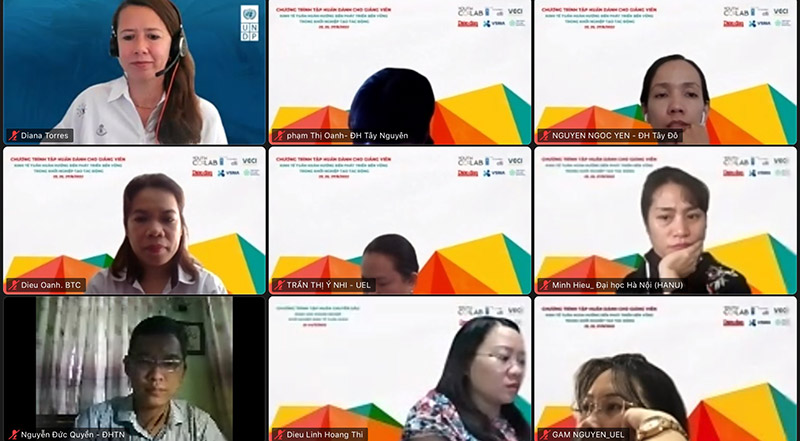Circular economy towards sustainable development in impact entrepreneurship
More and more young people choose to start an impact startup as a model that helps them achieve a dream of both starting a business and creating positive impacts on the environment and society.

Overview of the event: Youth Co:Lab – TOT Course: Circular Economy towards Sustainable Development in Impact Entrepreneurship
At COP26, Prime Minister Pham Minh Chinh announced strong commitments to net zero emissions by 2050. With this commitment, Viet Nam has joined one of 70 countries that have taken pledges to tackle one of the most pressing issues of our time. This also opened up many opportunities for cooperation in low-emission growth and promoting circular economy development in Viet Nam.
In June 2022, Deputy Prime Minister Le Minh Khai signed Decision, approving the circular economy development scheme, and setting a number of ambitious targets for the period ahead. This decision also focuses on raising awareness and investment concerns of enterprises and investors in Vietnam and foreign countries regarding circular economy; and promoting the application of the circular economy model to promote green transition of economic sectors.
Ms. Diana Torres- Assistant Resident Representative, Head of Governance and Participation Unit, said active circular economy development would be essential and suitable for the requirements of economic recovery and implementation of Sustainable development goals.
First, circular economy creates a new framework for the mission of “green economic recovery” from Covid-19, which offers a historic opportunity for countries around the world to shift to a more inclusive and sustainable development model. It contributes to reducing risks for businesses and the crisis of overproduction and scarcity of resources; creating motivation to invest, innovating technology, reducing production costs, increasing sustainable supply chain, and focusing on positive society-wide benefits that build economic, natural, and social capital.
Second, circular economy opens a more competitive economy where the country can take advantage of the shift of global finance for development and job creation that are inclusive and of a better quality than those in a business-as-usual setting. A circular economy could unlock up to 4.5 trillion USD in value and create millions of jobs in the global economy by 2030, according to an Accenture Strategy study.
“In Vietnam, Pandora, a Danish jewelry manufacturer, will invest USD 100 million to build the new facility in Vietnam according to the LEED Gold standard, a leading green building certification, and be powered by 100% renewable energy. It will create jobs for more than 6,000 craftspeople. Another example is that LEGO will pour over US$1 billion into building its first-ever carbon-neutral plant in Binh Duong Province, which will create up to 4,000 jobs over the next 15 years”, said Ms. Diana Torres.
Third, shifting from a linear economy towards a circular economy in impact entrepreneurship will create a great competitive advantage for young entrepreneurs, attracting investment from investors, and from national and international support programmes. For example, EQUO, Vietnam-based sustainability company with eco-friendly products, was selected a Top 18 Finalist in the UNDP’s EPPIC 2021 (Ending Plastic Pollution Innovation Challenge) and one of nine winners of the UNOPS (United Nations Office for Project Services) S3i Global Innovation Challenge for entrepreneurs. This year, EQUO has raised $1.3 million in seed investment from NextGen Ventures, Techstars, East Ventures with high evaluation of their products - plastics alternatives made from materials like coffee, coconut, and sugarcane.
Ms. Diana Torres share: “With Youth Co:Lab 2022, we will implement 3 main activities: (i) First, the series of training for young social entrepreneurs, impact mentors, and TOT on social impact and circular economy startups. (ii) Second, a competition and incubation programme for youth-led startups, focusing on circular economy. And(iii) finally, we will organize a series of national and international dialogues to connect young entrepreneurs with stakeholders in the startup ecosystem to promote impact entrepreneurship associated with the circular economy”.
“In order to best prepare for the development of youth-led impact startups, including support on gardening the early-stage ideas on the circular economy, and improving the investment readiness, we need and look forward to working with you, the trainers, mentors, investors, who are working with new businesses, including startups. I would like to take this opportunity to invite all of you to continue participating in the upcoming activities of the project. Together, we can unlock 'hidden value' helping start-ups transition to a circular economy to accelerate the achievement of the Sustainable Development Goals by 2030 and the commitment to net zero emissions by 2050”, said Ms. Diana Torres.








